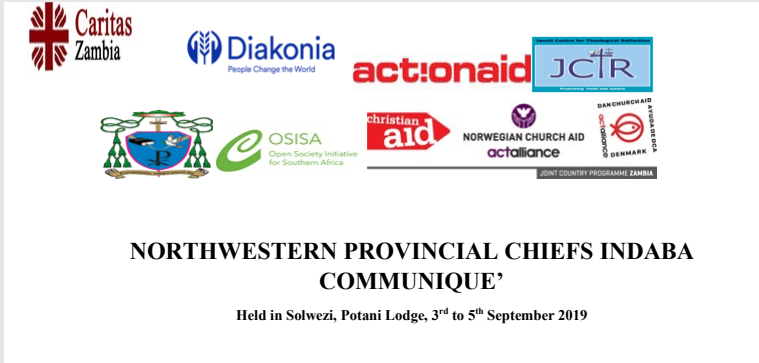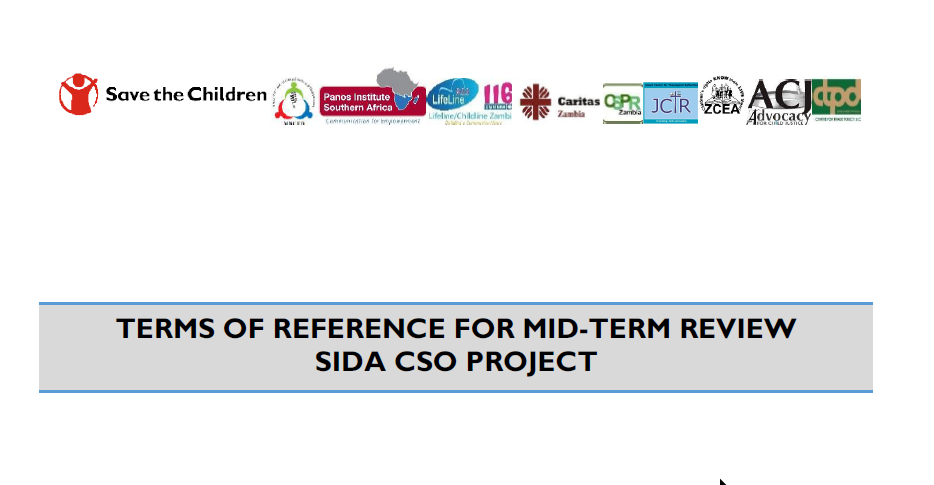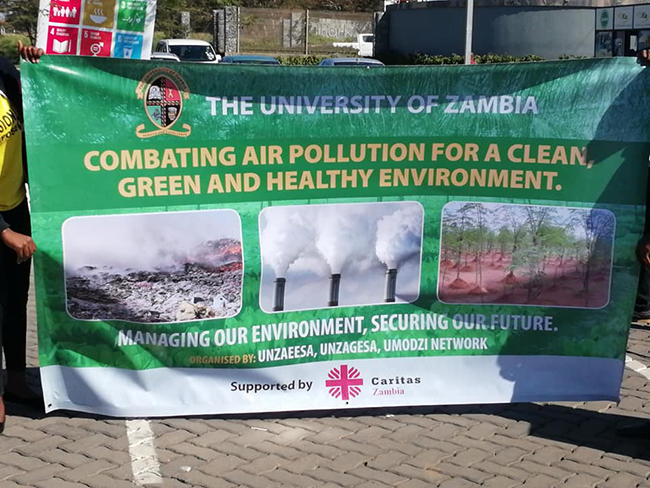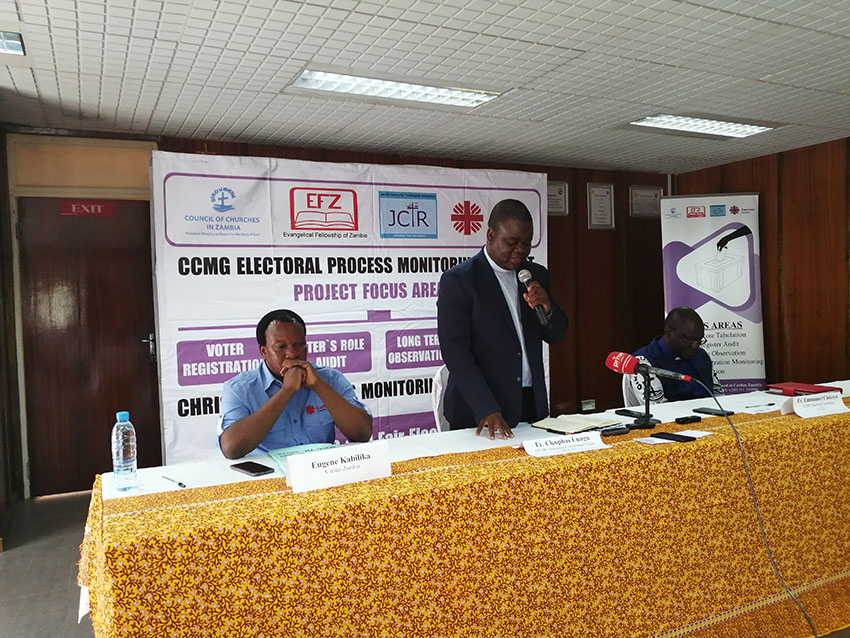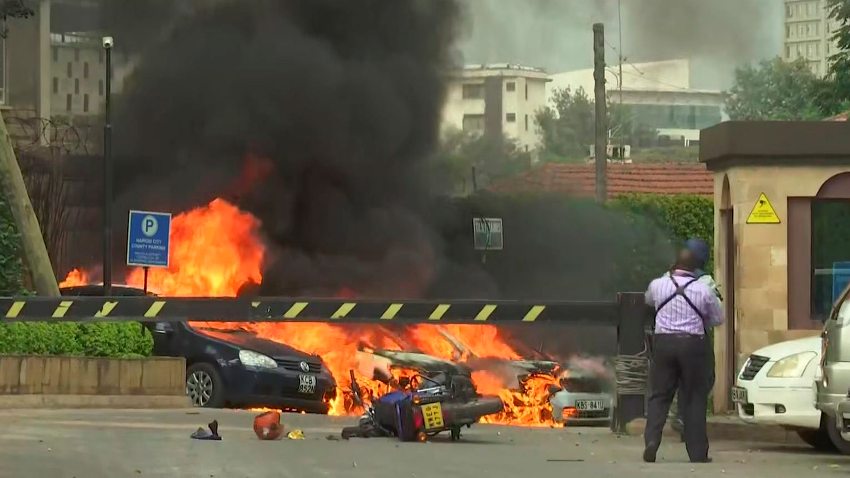Held in Solwezi, Potani Lodge, 3rd to 5th September 2019
PREAMBLE :
We royal highnesses of the North-Western province, namely from Mushindamo, Solwezi, Kalumbila, Kasempa, Mufumbwe, Manyinga, Kabompo, Zambezi, Mwinilunga and Ikelenge, met on the 3rd to 5th of September 2019 under the auspice of Caritas Solwezi, Caritas Zambia and the Jesuit Centre for Theological Reflections (JCTR) for a provincial chiefs mining indaba, held under the theme “Land and the Environment, Our Future, Care for Our Common Home.”
The chiefs’ indaba presented an opportunity for us to share knowledge, experiences and best practices on land and environment in our respective chiefdoms. We further appreciate the Government for the conducive in which they are operating.
Download the entire Northwestern Provincial Chiefs Indaba Communique’ here http://caritaszambia.org/phocadownload/general/chiefs-indaba-communique.pdf
Job Title: Real Estates Officer
Reports to: The Finance Manager
Purposes of the Job: Responsible for the overall management of assigned residential or commercial properties to satisfy the requirements of both The Zambia Episcopal Conference (ZEC) and the Tenants, to preserve and increase the value and integrity of the properties and to meet the financial objectives Bishops’ Conference and the Catholic Secretariat Management Team (CSMT).
Download the entire Job Description for the Real Estates Officer here http://caritaszambia.org/phocadownload/general/ZCCB-Real-Estate-Officer-Job-Offer.pdf
BACKGROUND
The ZCCB is the umbrella mother body of the Catholic Church in Zambia, with its Secretariat located in Kabulonga Residential Area (BRT 60 - Kabulonga Road). The Catholic Secretariat requires a competent hardworking individual to undertake the role of Human Resource Officer at the Catholic Secretariat and help with day to day management of the Human Resource Unit.
The entire Employment Opportunity - Human Resource Officer can be found and downloaded here http://caritaszambia.org/phocadownload/general/HR-Officer-Job-Advert.pdf
BACKGROUND
Save the Children Zambia, has been in existence in Zambia since 1989, fighting for the rights of children in the health and nutrition sector, education sector, social protection and governance sectors. The country office has invested a lot of resources both technical and financial support in helping children who are vulnerable and marginalized country wide through its programmes in Health and Nutrition, Education, Child Protection, Child Rights Governance, Humanitarian and Child Poverty. Over the past years Save the Children has built strong partnerships with Government through the Ministry of Education, Ministry of Health, and Ministry of Community Development and Social Welfare. Among international organisations, Save the Children Zambia has a good working relationship with partners like UNICEF, European Union, USAID, Care International, Plan International, Swedish Embassy and other important organisations and institutions. Besides that, SC Zambia networks with different Civil Society Organisations in the area of child rights across the five themes mentioned above.
Save the Children International Zambia Country office is implementing the Sida CSO appropriation whose span is 2017 to 2021, which relates to the Swedish government’s strategy for civil society organizations (CSO), whose underlying motive and rationale is that of a vibrant and pluralistic civil society in developing countries. The strategy, which promotes use of rights-based approaches, sees a vibrant and pluralistic civil society, as a prerequisite for democratization, poverty reduction and equitable and sustainable global development. The strategy also endeavors to align with the Global CSO Programme results framework and related Country Office (CO)/Regional Programme(RP) frameworks, and be responsive to the particular operating contexts, focusing on CP/CRG objectives and outcomes at three levels:
- 1. Changes in legislation, policies and practices
- 2. Capacities of civil society and the community to support children’s right, and
- 3. Changes in children’s participation and active citizenship.
As indicated above, the mid-term review of the overall projectin Zambia is to be conducted in the form of an internal learning and sharing process. The mid-term review will focus on thethree project objectiveswhich are being implemented through thepartners.
The three objectives fall under three project themes namely; Child Rights Governance (first objectives), Investment in children (second objective) and Child Protection (third objective). Below are the three objectives:
- 1. The Government of Zambia delivers quality health, education and protection for all children in Zambia.
- 2. The Government of Zambia allocates adequate resources and spends effectively in education, health and child protection interventions /services.
- - Civil society actors including children influence government at national and local levels to put in place structures and systems to prevent and respond to child protection issues in Zambia.
Under Child Rights Governance theme, the project has the has two objectives.
The first objective is being implemented by four partners namely;
- - Panos institute Southern Africa in Kaoma, Kasama, Kabwe, Petauke, Mukushi.
- - Zambia Civic Education Association (ZCEA) through Child Rights Business Principle (CRBP) project in Kitwe, Chisamba, Kapri- Mposhi and Kitwe.
- - National Child Rights Forum through Advocacy for Child Justice (ACJ) at national level.
- - Media Network on Child Rights and Development (MNCRD) in Lusaka Kitwe, Katete, Mongu, Choma.
The second objective is being implemented by four partners namely;
- - Zambia Civic Education Association (ZCEA) through Child Budget Network (CBN) in Lusaka, Rufunsa and Choma.
- - Centre for Trade Policy and Development (CTPD) at national level.
- - Jesuit Centre for Theological Reflection (JCTR) in Lufwanyama and Kitwe.
- - Civil Society for Poverty Reduction (CSPR) in Chipata and Mansa.
Under the Child protection theme, the project has one objective which is being implemented by two partners namely:
- - Caritas ZambiainMkushi, Ngabwe, Kalabo, Nkeyema, Sinazongwe and Siavonga.
- - Lifeline/Childline Zambia in Katete, Kapiri-Mposhi, Lufwanyama and Choma.
The entire TERMS OF REFERENCE FOR MID-TERM REVIEW SIDA CSO PROJECT can be found and downloaded here http://caritaszambia.org/phocadownload/general/Terms-of-Reference-for-Mid-Term-Review-for-SIDA-CSO-Project.pdf
ACKNOWLEDGEMENTS
Caritas Zambia would like to acknowledge and thank Save the Children for their financial and technical support in ensuring that this research was a success. We further extend our gratitude to Women and Law in Southern Africa (WLSA) team for their expertise and research experience in compiling this research. Further Caritas Zambia is grateful to all the key stakeholders consulted from the six (6) project target districts namely, Sinazongwe, Siavonga, Kalabo, Nkeyema, Mkushi, and Ngabwe, without the input and cooperation of the stakeholders in these districts, this research would not have been a success.
In addition, we are grateful to the editing team comprising of the Caritas Zambia Unit Head Pro-grammes and the Caritas Zambia Programme Officer – Child Protection for their commitment in inputting and editing the report. Finally but not the least, Caritas Zambia would also like to render its gratitude to the diocesan staff from Monze, Mongu, and Kabwe for their determined and persistence efforts that saw this work to its conclusion.
The resources used by Save the Children for this document have been financed through Swedish Development Assistance. SIDA does not necessarily share the expressed views and interpretations. Responsibility for the content lies entirely with Caritas Zambia.
The entire Child Marriage in Zambia: Situation Analysis Research Report can be found and downloaded here http://caritaszambia.org/phocadownload/research_reports/Child-Marriage-in-Zambia-Situation-Analysis.pdf
PRESS STATEMENT ON THE HUNGER SITUATION
IN ZAMBIA IN THE AREAS AFFECTED BY THE UNFAVORABLE 2018/2019 RAIN PATTERN- A CALL FOR HELP
“For I was hungry and you gave me to eat.” (Mt 25: 35)
PREAMBLE
We the members of the Caritas family drawn from the dioceses of Chipata, Kabwe, Kasama, Livingstone, Mansa, Monze, Mpika, Ndola, Lusaka, Mongu and Solwezi; gathered in Lusaka at Kapingila house from 14th to 17th of June 2019; deliberating on what the Church teaches on the need for increased spirituality of Charity, Justice and Peace; and the call for the Church to be prophetic, vigilant, intrusive, engaging, and always seeking to be part and parcel of decision-making processes;
Scrutinizing the "signs of our times" and seeking to detect the meaning of emerging history while at the same time sharing the aspirations and questionings of all those who want to build a more humane world;
Listening to the Word of God that inspire us to be instruments of justice, peace and love in order to spread this love to all people especially those who are currently suffering from hunger and lack of clean water;
Aware that hungry people are vulnerable and easily manipulated, leading to loss of dignity;
And Having analysed the reports of the hunger situation in Southern, Central, Western, Eastern, Luapula and other parts of the country, we would like to inform the nation of our concerns as well as to make an earnest appeal to all as follows:
The Hunger situation
In order to fully comprehend the hunger situation in the country, the Catholic Church through Caritas Zambia working with diocesan partners gathered information from the affected households using community interviews, focus group discussions, direct observations, and household field visitation in the affected areas. Apart from this fact-finding mission, Caritas Zambia also sent out two teams in Monze and Luapula to have first-hand information on the situation in these two areas. This information was collated with that of the DMMU Rapid Assessment Report of March 2019. These assessments reveal that:
Southern, Western and some parts of Eastern, Central and Lusaka provinces experienced total crop failure. This means that households in these areas did not harvest anything that would help to sustain their livelihoods up to the next agricultural season. There are fifty districts affected by this situation and households are currently already experiencing serious hunger.
According to the Vulnerability Assessment Committee (VAC) under the DMMU, a total of 418,969 households were affected by the dry spell hazard. In the places visited by the Catholic Church agents, 79% of the crops were affected by drought, 13% by floods while 4% were affected by both drought and floods.
Apart from crop failure, the prolonged dry spell during the last farming period has created a water shortage for both animals and people. There are already reports from Gwembe that people are sharing water with animals.
In addition, following the crop failure due to the drought, government, under the Ministry of Agriculture has cancelled the holding of the annual Agriculture Shows in the affected provinces that include Lusaka, Southern and Western provinces. This is clear evidence that the situation is stressful in these areas.
There are currently many households that have nothing to eat and are either surviving from wild fruits or are getting by without any food. This situation will certainly compromise the nutrition and health status of most people especially the children, and if nothing is urgently done, we may begin to experience deaths from hunger.
Evidence of widespread distribution of food staff to all these people is missing. In places where this is happening, the amount of food given is so little that households are failing to meet their food requirements.
In our liturgical celebrations we do pray this way, ‘Open our eyes to the needs of our brothers and sisters; inspire in us words and actions to comfort those who labour and are burned. Make us serve them truly, after the example of Christ and at his command. And may your Church stand as a living witness to truth and freedom, to peace and justice, that all people may be raised up to a new hope’ (Eucharistic Prayer IV, Jesus, Who Went About Doing Good).
It is the same prayer that says, ‘Grant that all the faithful of the Church, looking into the signs of the times by the light of faith, may constantly devote themselves to the service of the Gospel. Keep us attentive to the needs of all that, sharing their grief and pain, their joy and hope, we may faithfully bring them the good news of salvation and go forward with them along the way of your Kingdom’ (Eucharistic Prayer III, Jesus, the Way to the Father).
It is such prayers that inspire us to do what we do and wish to do as Caritas Family and as members of the Catholic Church and all the people of good will.
Our Appeal to all people of Good Will
The Zambia Conference of Catholic Bishops (ZCCB) through Caritas Zambia in collaboration with Catholic Relief Services (CRS), Norwegian Church Aid (NCA) and CAFOD is putting together relief effort to contribute towards the alleviation of hunger in the affected regions. This contribution to the government’s efforts will target 10% (42,000 households) of the total estimated number of households (418, 969) currently in dire need of help. And so we call upon Zambians with the ability to make contributions to this noble cause.
Special Appeal to Christians
As followers of Christ, Jesus told us that the mark of being truly his disciple is to respond to the needs of the little brothers and sisters who suffer, “for I was hungry and you gave me to eat.” Mt 25: 35, “…I was thirsty and you gave me to drink…” Mt 25:35. Everyone needs food for the body. However, there are many people in Zambia this time who are getting by without food. This is not as a result of their own fault but as a result of the ravages of Mother Nature influenced by our actions that cause climate change. In this situation, we implore you to consider how good stewardship practices of your own food habits can benefit others who do not have resources to mitigate their hunger situation. It is an act of love to help others to obtain their bodily nourishment, especially those in greatest need.
Remember that many of your brothers and sisters in the affected areas do not have access to clean water and suffer from the lack of this basic necessity. Your support no matter how little will go a long way in saving that little child in Kaoma, Pemba and Kazungula.
Appeal to Politicians
To all political players in these affected areas, we urge you to put aside your partisan inclination in this matter. It is an act of injustice to gain political mileage in a situation where people are in dare need of food and are vulnerable. Regardless of where the help is coming from, people must not be told to support political party A or B just because they have provided some food to alleviate people’s hunger. Food must be distributed without strings attached.
Appeal to Government
In view of the staggering number of households that have been affected by the floods and the dry spell, we call upon the government to acknowledge the gravity of the problem and declare the affected areas as a disaster. This will help to mobilise resources and the necessary food items that are needed to feed these people from now on and also support them to recover during the next farming season.
Conclusion
Dear brothers and Sisters, remember these words, ‘Caritas Christi Urget Nos- The Love of Christ Urges us’ (2 Cor 5:14). All through Christian history, Jesus Christ identified himself closely with the hungry, the thirsty, the strangers, the naked, the sick, the prisoners. As followers of Christ, ours is to recognise the face of Christ in the faces of our brothers and sisters who suffer today the effect of poor harvest and on one hand, floods.
The Catholic Church is taking this board step to complement government efforts to provide relief to the affected households in Southern, Western, Lusaka, Eastern, Central and Lunga in Luapula Province. The Church is targeting 42,000 households who have been affected by the unfavourable weather conditions during the 2018/19 production season. In order to help feed these households and also help them to recover from the 2018/2019disaster, ZCCB will need to spend not less than, US$ 9,399,427. Your contribution and help towards this cause will be greatly appreciated.
May Sant Martin De Porres, Saint Mother Teresa of Calcutta and Saint Oscar Romero intercede for us as we begin this journey.
May God bless you,
May God Bless Zambia.
+Bishop Evans Chinyama Chinyemba OMI
The World Environment Day (WED) is commemorated every year on 5th June and is the United Nation’s principal vehicle for encouraging worldwide awareness and action for the protection of the environment, global warming, sustainable consumption and wildlife crime.
Each year, WED celebrations highlight a specific aspect of the environment. This year, the global WED is being celebrated under the theme “BEAT AIR POLLUTION”. In Zambia, the national theme is ‘Combating Air Pollution for a Clean, Green and Healthy Zambia’.
For more, download the entire Press Statement for the World Environment Day 2019 Celebration here http://caritaszambia.org/index.php/publications/general/file/141-press-statement-the-world-environment-day-2019
ROAN AND BAHATI PARLIAMENTARY BY-ELECTIONS STATEMENT
12 April 2019
1.0. INTRODUCTORY REMARKS
As part of its ongoing mission to support democratic development and promote free, fair and credible electoral processes in Zambia, the Christian Churches Monitoring Group (CCMG) consortium undertook a non-partisan monitoring of the April 2019 parliamentary by-elections in Bahati and Roan constituencies. CCMG’s observation of the parliamentary by-elections included pre-election observation and Election Day monitoring in Roan constituency. CCMG’s mission is to strengthen electoral processes and encourage citizen participation in democratic governance in Zambia. Through civic and voter education, non-partisan election monitoring, electoral reform advocacy and capacity building of civil society organizations, CCMG promotes democratic development and good governance.
CCMG created the Electoral Process Monitoring Project partnership to effectively monitor the 2015 presidential election, 2016 general elections and now the 2019 parliamentary by-elections. CCMG partner organizations include: the Council of Churches in Zambia (CCZ), Evangelical Fellowship of Zambia (EFZ), Jesuit Centre for Theological Reflection (JCTR) and Zambia Conference of Catholic Bishops (ZCCB) through Caritas Zambia.
2. METHODOLOGY
On April 11 CCMG deployed 26 trained, ECZ-accredited stationary observers to polling stations in the Roan constituency, in addition to three mobile monitors in Roan and three mobile monitors in Bahati. Stationary observers were present at 25 of 43 polling stations (randomly selected) and covered all 14 wards in Roan. There were no stationary observers in Bahati. Election observers arrived in Roan at their assigned polling station and polling stream at 05:30 hours and remained there throughout voting and counting until the official results for the parliamentary by-election for the entire polling station were publicly announced and posted.
The CCMG election observers utilized a customized Election Day checklist designed to fully capture and evaluate the election process and results. Throughout Election Day the observers sent in a total of five monitoring reports on the conduct of the election via coded text messages using their mobile phones. On April 11, 100% of CCMG’s election observers successfully delivered their monitoring reports. This data was captured and analyzed at the CCMG Date Centre in Lusaka. As part of the electoral observation process, observers also reported any critical incidents in the field as they occurred to their mobile monitors and the CCMG Data Centre.
3. SELECT FINDINGS (ROAN CONSTITUENCY)
Polling Station Set-up:
100% of polling streams (monitored) opened on time (06h00-06h30).
100% of ballot boxes in polling streams (monitored) were sealed.
100% of ballot boxes in polling streams (monitored) were empty.
The average number of polling officials per polling stream (monitored) was five.
46% of polling officials per polling stream (monitored) were women.
Voting:
At 100% of polling streams (monitored) election officials stamped every ballot paper with the official mark/stamp.
At 100% of polling streams (monitored) no one was permitted to vote without having a Voter
ID Card.
At 96% of polling streams (monitored) voters’ fingers were marked with indelible ink after voting.
At 65% of polling streams (monitored) UPPZ had a party agent present at the polling stream. At 100% of polling streams (monitored) PF had a party agent present at the polling stream.
At 100% of polling streams (monitored) NDC had a party agent present at the polling stream. At 81% of polling streams (monitored) PAC had a party agent present at the polling stream.
Closing and Counting:
At 100% of polling streams (monitored) all polling agents present were permitted to observe the counting of parliamentary ballot papers.
At 92% of polling streams (monitored) there were no unauthorized persons present during the counting of the parliamentary ballot papers.
At 96% of polling streams (monitored) there were no complaints by party agents.
No one intimidated or harassed election officials during the counting of ballot papers at streams
(monitored).
Elections Results:
At 100% of polling streams (monitored) official results were recorded on the official results form.
At 100% or polling stations (monitored) party agents signed the official results form.
At 100% of polling stations (monitored) the official results for the parliamentary by-elections were publicly posted.
4. INCIDENTS
CCMG received a total of seven critical incident reports from Roan and Bahati, of which six were confirmed, by its accredited election observers. The most serious was an incident in Roan that involved the beating of a group of party supporters en route to polling stations by their opponents resulting in serious injury and two supporters treated in hospital. Another female voter in the same area was attacked by a group of political cadres and injured. CCMG condemns in the strongest terms all electoral violence and calls upon the political parties to honor their nonviolence pledge and for the police to investigate and bring to justice those responsible for these terrible acts.
The other critical incidents received on Election Day by CCMG were: campaigning by political party candidates and officials at polling stations; hand-outs/vote buying by political parties, a party agent accusing an ECZ official (who was subsequently rotated to a different polling station) of voter tampering; and harassment or violence against political party supporters. However, these appear to be isolated incidents and did not occur in large numbers.
CCMG also noted that one of its accredited observers had difficultly gaining access to a polling station and polling stream. The decentralization of the accreditation process led this particular polling station supervisor to misunderstand observer accreditation requirements – this was an isolated occurrence and resolved.
5. CONCLUSION
Based on the findings of the CCMG’s Parliamentary By-Election Observation, Zambians can have confidence that voting and counting processes proceeded with only small issues at the overwhelming majority of polling stations and polling streams monitored. However, CCMG notes that there some were critical issues with the general electoral environment.
Importantly, PF had party agents at 100% of the polling stations (monitored) during counting and 100% of PF party agents signed the official results form. Similarly, at 100% of polling stations (monitored) an NDC party agent was present during counting and 100% of NDC party agents signed the official results form. Furthermore, at 100% of polling stations (monitored) all political party agents present signed the official results form and at 100% of polling stations (monitored) the official results were posted for the public to see. This clearly demonstrates it was a credible processe for voting at polling stations and polling streams in Roan.
CCMG calls on the winners to be magnanimous in victory. Voters will go to the polls again in
2021 and candidates and political parties should set a positive example of calm, civility and cooperation going forward.
Despite the credibility of the Election Day processes, CCMG continues to be concerned about low turnout. More analysis is needed to understand why voters are not participating and how to increase voter turnout. Furthermore, we need to ensure that in 2021:
• Political leaders maintain their pledge and commitment to nonviolence;
• Political parties condemn voter handouts and vote buying and these negative practices are eliminated; and
• Political parties and citizens should allow the ECZ to carry out their duties with professionalism and without intimidation or harassment;
• The ECZ, civil society organizations (CSOs), and faith-based organisations expand voter outreach and education and continue to target women, youth and people with disabilities.
In closing, the CCMG Steering Committee congratulates Zambians on successful by-elections in Roan and Bahati, and appeals to everyone, especially all candidates and their supporters, to act responsibly and in the interest of the nation. Once again Zambia was able to set a constructive example of democracy in action in Africa.
The CCMG Steering Committee would like to thank the volunteers from our four organisations that deployed in Roan and Bahati as Election Day observers and mobile monitors. Your efforts have helped strengthen our democracy. CCMG also greatly appreciates the efforts of the election officials to ensure Zambians had a well-organized and executed election process. Finally, CCMG commends all Zambians who went to the polls yesterday to exercise their right to vote.
GOD BLESS ZAMBIA!
Fr. Cleophas Lungu, ZCCB
CCMG – Steering Committee Chair
Fr. Emmanuel Chikoya, CCZ
CCMG – Steering Committee Member
CONTACT DETAILS:
Eugene Kabilika, Caritas Executive Director: This email address is being protected from spambots. You need JavaScript enabled to view it./0977712052
The original signed statement found here http://caritaszambia.org/phocadownload/general/CCMG-April-2019-Roan-Bahati-Pre-Election-Statement-10th-April-2019.pdf
1 JANUARY 2019
Good politics is at the service of peace
1. “Peace be to this house!”
In sending his disciples forth on mission, Jesus told them: “Whatever house you enter, first say, ‘Peace be to this house!’ And if a son of peace is there, your peace shall rest upon him; but if not, it shall return to you” (Lk 10:5-6).
Bringing peace is central to the mission of Christ’s disciples. That peace is offered to all those men and women who long for peace amid the tragedies and violence that mark human history.[1]The “house” of which Jesus speaks is every family, community, country and continent, in all their diversity and history. It is first and foremost each individual person, without distinction or discrimination. But it is also our “common home”: the world in which God has placed us and which we are called to care for and cultivate.
So let this be my greeting at the beginning of the New Year: “Peace be to this house!”
2. The challenge of good politics
Peace is like the hope which the poet Charles Péguy celebrated.[2] It is like a delicate flower struggling to blossom on the stony ground of violence. We know that the thirst for power at any price leads to abuses and injustice. Politics is an essential means of building human community and institutions, but when political life is not seen as a form of service to society as a whole, it can become a means of oppression, marginalization and even destruction.
Jesus tells us that, “if anyone would be first, he must be last of all and servant of all” (Mk 9:35). In the words of Pope Paul VI, “to take politics seriously at its different levels – local, regional, national and worldwide – is to affirm the duty of each individual to acknowledge the reality and value of the freedom offered him to work at one and the same time for the good of the city, the nation and all mankind”.[3]
Political office and political responsibility thus constantly challenge those called to the service of their country to make every effort to protect those who live there and to create the conditions for a worthy and just future. If exercised with basic respect for the life, freedom and dignity of persons, political life can indeed become an outstanding form of charity.
3. Charity and human virtues: the basis of politics at the service of human rights and peace
Pope Benedict XVI noted that “every Christian is called to practise charity in a manner corresponding to his vocation and according to the degree of influence he wields in the pólis… When animated by charity, commitment to the common good has greater worth than a merely secular and political stand would have… Man’s earthly activity, when inspired and sustained by charity, contributes to the building of the universal city of God, which is the goal of the history of the human family”.[4] This is a programme on which all politicians, whatever their culture or religion, can agree, if they wish to work together for the good of the human family and to practise those human virtues that sustain all sound political activity: justice, equality, mutual respect, sincerity, honesty, fidelity.
In this regard, it may be helpful to recall the “Beatitudes of the Politician”, proposed by Vietnamese Cardinal François-Xavier Nguyễn Vãn Thuận, a faithful witness to the Gospel who died in 2002:
Blessed be the politician with a lofty sense and deep understanding of his role.
Blessed be the politician who personally exemplifies credibility.
Blessed be the politician who works for the common good and not his or her own interest.
Blessed be the politician who remains consistent.
Blessed be the politician who works for unity.
Blessed be the politician who works to accomplish radical change.
Blessed be the politician who is capable of listening.
Blessed be the politician who is without fear.[5]
Every election and re-election, and every stage of public life, is an opportunity to return to the original points of reference that inspire justice and law. One thing is certain: good politics is at the service of peace. It respects and promotes fundamental human rights, which are at the same time mutual obligations, enabling a bond of trust and gratitude to be forged between present and future generations.
4. Political vices
Sadly, together with its virtues, politics also has its share of vices, whether due to personal incompetence or to flaws in the system and its institutions. Clearly, these vices detract from the credibility of political life overall, as well as the authority, decisions and actions of those engaged in it. These vices, which undermine the ideal of an authentic democracy, bring disgrace to public life and threaten social harmony. We think of corruption in its varied forms: the misappropriation of public resources, the exploitation of individuals, the denial of rights, the flouting of community rules, dishonest gain, the justification of power by force or the arbitrary appeal to raison d’état and the refusal to relinquish power. To which we can add xenophobia, racism, lack of concern for the natural environment, the plundering of natural resources for the sake of quick profit and contempt for those forced into exile.
5. Good politics promotes the participation of the young and trust in others
When the exercise of political power aims only at protecting the interests of a few privileged individuals, the future is compromised and young people can be tempted to lose confidence, since they are relegated to the margins of society without the possibility of helping to build the future. But when politics concretely fosters the talents of young people and their aspirations, peace grows in their outlook and on their faces. It becomes a confident assurance that says, “I trust you and with you I believe” that we can all work together for the common good. Politics is at the service of peace if it finds expression in the recognition of the gifts and abilities of each individual. “What could be more beautiful than an outstretched hand? It was meant by God to offer and to receive. God did not want it to kill (cf. Gen 4:1ff) or to inflict suffering, but to offer care and help in life. Together with our heart and our intelligence, our hands too can become a means of dialogue”.[6]
Everyone can contribute his or her stone to help build the common home. Authentic political life, grounded in law and in frank and fair relations between individuals, experiences renewal whenever we are convinced that every woman, man and generation brings the promise of new relational, intellectual, cultural and spiritual energies. That kind of trust is never easy to achieve, because human relations are complex, especially in our own times, marked by a climate of mistrust rooted in the fear of others or of strangers, or anxiety about one’s personal security. Sadly, it is also seen at the political level, in attitudes of rejection or forms of nationalism that call into question the fraternity of which our globalized world has such great need. Today more than ever, our societies need “artisans of peace” who can be messengers and authentic witnesses of God the Father, who wills the good and the happiness of the human family.
6. No to war and to the strategy of fear
A hundred years after the end of the First World War, as we remember the young people killed in those battles and the civilian populations torn apart, we are more conscious than ever of the terrible lesson taught by fratricidal wars: peace can never be reduced solely to a balance between power and fear. To threaten others is to lower them to the status of objects and to deny their dignity. This is why we state once more that an escalation of intimidation, and the uncontrolled proliferation of arms, is contrary to morality and the search for true peace. Terror exerted over those who are most vulnerable contributes to the exile of entire populations who seek a place of peace. Political addresses that tend to blame every evil on migrants and to deprive the poor of hope are unacceptable. Rather, there is a need to reaffirm that peace is based on respect for each person, whatever his or her background, on respect for the law and the common good, on respect for the environment entrusted to our care and for the richness of the moral tradition inherited from past generations.
Our thoughts turn in a particular way to all those children currently living in areas of conflict, and to all those who work to protect their lives and defend their rights. One out of every six children in our world is affected by the violence of war or its effects, even when they are not enrolled as child soldiers or held hostage by armed groups. The witness given by those who work to defend them and their dignity is most precious for the future of humanity.
7. A great project of peace
In these days, we celebrate the seventieth anniversary of the Universal Declaration of Human Rights, adopted in the wake of the Second World War. In this context, let us also remember the observation of Pope John XXIII: “Man’s awareness of his rights must inevitably lead him to the recognition of his duties. The possession of rights involves the duty of implementing those rights, for they are the expression of a man’s personal dignity. And the possession of rights also involves their recognition and respect by others”.[7]
Peace, in effect, is the fruit of a great political project grounded in the mutual responsibility and interdependence of human beings. But it is also a challenge that demands to be taken up ever anew. It entails a conversion of heart and soul; it is both interior and communal; and it has three inseparable aspects:
- peace with oneself, rejecting inflexibility, anger and impatience; in the words of Saint Francis de Sales, showing “a bit of sweetness towards oneself” in order to offer “a bit of sweetness to others”;
- peace with others: family members, friends, strangers, the poor and the suffering, being unafraid to encounter them and listen to what they have to say;
- peace with all creation, rediscovering the grandeur of God’s gift and our individual and shared responsibility as inhabitants of this world, citizens and builders of the future.
The politics of peace, conscious of and deeply concerned for every situation of human vulnerability, can always draw inspiration from the Magnificat, the hymn that Mary, the Mother of Christ the Saviour and Queen of Peace, sang in the name of all mankind: “He has mercy on those who fear him in every generation. He has shown the strength of his arm; he has scattered the proud in their conceit. He has cast down the mighty from their thrones, and has lifted up the lowly; …for he has remembered his promise of mercy, the promise he made to our fathers, to Abraham and his children for ever” (Lk 1:50-55).
From the Vatican, 8 December 2018
Francis
[1] Cf. Lk 2:14: “Glory to God in the highest, and on earth peace among men with whom he is pleased”.
[2] Cf. Le Porche du mystère de la deuxième vertu, Paris, 1986.
[3] Apostolic Letter Octogesima Adveniens (14 May 1971), 46.
[4] Encyclical Letter Caritas in Veritate (29 June 2009), 7.
[5] Cf. Address at the “Civitas” Exhibition-Convention in Padua: “30 Giorni”, no. 5, 2002.
[6] BENEDICT XVI, Address to the Authorities of Benin, Cotonou, 19 November 2011.
[7] Encyclical Letter Pacem in Terris (11 April 1963), ed. Carlen, 24.
Entire message in PDF version can be downloaded here http://caritaszambia.org/index.php/publications/state-of-the-nation/file/138-pope-francis-message-on-52nd-world-day-of-peace-2019
PICTURE: Parishioners of Holy Trinity-Kileleshwa, St Austin and Consolata shrine serve food and refreshments to rescue teams at the 14 Riverside drive on 16th January 2019.
UPDATES AND HUMANITARIAN RESPONSE – DUSIT D2 HOTEL TERRORIST ATTACK
Country - Kenya
Location: Dusit Hotel, 14 Riverside Drive, Westlands, Nairobi .
January 15, 2019: Suspected Terrorists’ car arrives at the Chiromo/14 Riverside Drive junction around 2.30pm and is parked at the entrance for 30 minutes. The Hotel CCTV captured them in a silver 5-seater hatchback. They walked towards security officers at the hotel’s gate, where they threw explosives at the security agents. Three vehicles on fire were then spotted at the scene.
There were reports of gunfire and explosions in the vicinity of the Dusit 2 Hotel, in the Westlands neighbourhood of Nairobi between 3:48PM and 3:58PM.
The Directorate of Criminal Investigations arrived at the scene at around 4PM, by this time, social media was awash with claims of occupants trapped in dusitD2 alleging that the facility is under attack. The armed law enforcement agents arrived at the facility shortly after.
Between 4:20PM and 4:50 PM, rescue mission by the Recce squad, Kenya Airforce, firefighters and the Kenya Red Cross begun, with ambulances being spotted ferrying the casualties to various city hospitals.
January 16, 2019: There was gunfire on the 7th floor of Dusit D2 Hotel on Riverside drive at 6am, raising fears that terrorists could still be in the building holding people hostage. The Government of Kenya has advised that all terrorists involved in the Dusit2 Hotel attack have been neutralized. Follow-on security operations are continuing in the Dusit2 Hotel and its vicinity. Addressing the nation on Wednesday, Uhuru said the security operation ended at about 9.30am.
Impact of the Attack
January 16, 2019: The Kenya Red Cross and hospitals in Nairobi have made a fresh appeal for blood donations following the 14 Riverside attack in Nairobi. This comes after President Uhuru Kenyatta, on 16th January, confirmed that 14 people were killed during the siege, but another 700 rescued. Reports also indicate that over 30 people suffered serious injuries and were admitted to various hospitals.
Following the earlier briefing by H.E the president, the office of the Inspector General National Police service confirmed the final tally as follows:
• Additional six bodies were found at the scene. One Police Officer succumbed to his injuries while undergoing treatment.
• 28 persons were admitted in various hospitals in Nairobi.
• 5 terrorists were eliminated.
• 16 Kenyan Nationals, 1 Briton, 1 American and 3 persons of African descent lost their lives to the attack.
Humanitarian Needs:
Dr. Boyanu Mugeni of Avenue Hospital confirmed that the facility received a total of 22 victims of the attack since Tuesday evening. She said the institution and the disaster management team have set up a psychological support centre within to help the victims and their families. Other hospitals receiving patients were M.P. Shah, Aga Khan & Kenyatta Hospitals.
Blood donations are ongoing at the following venues: Avenue, M.P. Shah, Aga Khan & Kenyatta Hospitals, as well as August 7th Memorial Park.
Nairobi: Avenue Hospital (First Parklands Avenue), Aga Khan Hospital, Bomb Blast Memorial Park (August 7th Memorial Park), Kenyatta National Hospital and MP Shah Hospital
Mombasa: Kenya Red cross offices on Moi Avenue, opposite University of Nairobi’s Mombasa campus
Kisumu: Regional Blood Transfusion centre, Kisumu.
Humanitarian Assistance by the Catholic Church.
Caritas Kenya, in solidarity with the local parishes, visited the site in the morning of Wednesday and consoled the relatives of those affected by the attack. The local parishes located near the scene of the incident, namely Holy Trinity-Kileleshwa, St. Austin and Consolata Shrine, mobilized Christians to provide food, soft drinks and water to the rescue teams. Parish teams served breakfast and lunch to the rescue teams on Wednesday 16th January 2018.
- PASTORAL LETTER: Rebuild Hope, Trust, Confidence and Stability in Zimbabwe
- Invitation to the Ecumenical Prayer Service on care for Creation at Regina Pacis Catholic Church in Chawama Compound
- ENCYCLICAL LETTER LAUDATO SI’ OF THE HOLY FATHER FRANCIS ON CARE FOR OUR COMMON HOME
- Policy brief on the Seed Sector: CSOs express concern on reforms around the seed sector
- Press Statement by the Three Church Mother Bodies on National Dialogue and Reconciliation
- Republic of Zambia Financial Intelligence Centre Money Laundering/Terrorist Financing Trends Report 2017
- First Edition of the Caritas Zambia Bulletin
- Expression of Interest: Study on ending Child Marriages in Zambia
- CARITAS Zambia Statement on the Need for Genuine and Inclusive National Dialogue
- Report on the seed sector in Zambia - Overview on the political, social and economic aspects
About Caritas Zambia
Caritas Zambia is a Catholic Organisation that is an integral structure of the Zambia Conference of Catholic Bishops (ZCCB). The Conference of Bishops is a permanent grouping of Bishops of a given nation or territory that jointly exercises certain pastoral functions on behalf of the Christian faithful of their territory. This is done for the sake of effective evangelisation. To promote the principle of the common good which the Church offers humankind, especially through forms and programmes of the apostolate which are fittingly adapted to the circumstances of the time and place, is the role of Bishops.
Kapingila Hse, Kabulonga Rd, Plot BRT6, P.O.Box 31965, Lusaka 10101, Zambia.
Tel: +260-211-260980 | +260-211-261789

